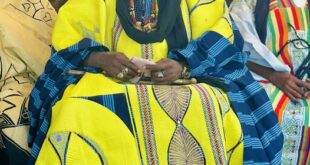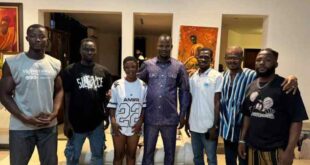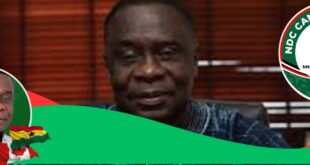The Asantehene, Otumfuo Osei Tutu II has added his voice to the ongoing debate ahead of the December 17 referendum on whether or not political parties should be allowed to sponsor candidates at local level elections.
Delivering a lecture at the University of Professional Studies, Accra (UPSA) on Friday evening [November 22, 2019], the Asantehene called for cool heads.
“Because this is a matter of such momentous importance, I hope, all concerned will step back and take the heat out, so we can see the light in the discourse,” the Asantehene said.
The occasion was the third annual leadership lecture organised by the UPSA, where the Asantehene is an alumnus.
Touching on the referendum, the Asantehene expressed concern about the neglect of chiefs in the ongoing reforms at the local government level.
He said had chiefs been consulted, some chiefs would not have declared that the proposal to elect Metropolitan, Municipal and District Chief Executives (MMDCEs) and political party participation in the same process were incompatible.
“Local government in the modern era is only traditional government in Western attire. How is it possible then that the central government representing the modern state and nananom [chiefs] representing the traditional state could find no space for engagement for the consideration of a major reform on local government and to agree on a common position before such crucial reforms were rolled out.”
“If there had been such engagement, I could not think of how anyone would have ignored the logic in the case for according our chiefs the rightful representation in the new structure. And by the same token, I could not think of how any chief would have seen any incompatibility in the removal of the entrenched clauses in the Constitution to permit the election of the metro and district chief executives or mayors and also allow political parties to sponsor candidates for local elections,” he said.
Otumfuo Osei said it may be worth recalling that the 1992 constitution was forged at a time of considerable scepticism about political parties.
“There was a substantial body of opinion, albeit in the minority, who would have preferred to do without them and the adoption of a system which allowed it at the top of the pyramid but excluded it from the grassroots, was a necessary compromise to re-start the engine of democracy.”
He added: “But it is possible today to argue that an unintended consequence of the constitutional arrangement is the One Party rule I have discussed earlier. By giving the President the power not only to appoint the chief executives or Mayors but also a whopping 30% of the membership of councils, this ensures that regardless of the political orientation of any district, the ruling party at the centre rules everywhere and everything. Another unintended consequence that I see is the elimination of any possible space for political compromise.”
“A fundamental principle of democracy is that the minority have their say but the major have their way. But it is also true that democracy perishes political actors learn to compromise. The examples of all democratic states testify a system which allows different political parties to control local and central government institutions create conditions in which they to learn to work with each other, and to do this through compromise on policies. It is the way to constrain excessive power and restrain extremism in opposition, and allows a measure of power-sharing.”
“Our chiefs have a unique capacity to strengthen the support mechanism for national development, but more than that, there is an astonishing range of talent on which the state can draw to strengthen most of the state institutions. By allowing them adequate representation, we shall accord them the right role to hold the balance between the contesting political parties and help restrain them from any excesses. ”
Also at the same lecture, Otumfuo Osei Tutu II advised politicians not to see going into politics as a way of going to make wealth but a service to the nation.
Courtesy call on Bawumia
From the lecture, the Asantehene visited Vice President Dr Mahamudu Bawumia at the seat of government at the Jubilee House in Accra.
In a post on Facebook, Vice President Bawumia said, “it was such an honour to receive Otumfuo at the Jubilee House.”
He added: “We discussed issues of national interest geared towards national development and growth.”
Source: Graphic.com.gh
 Home Of Ghana News Ghana News, Entertainment And More
Home Of Ghana News Ghana News, Entertainment And More





